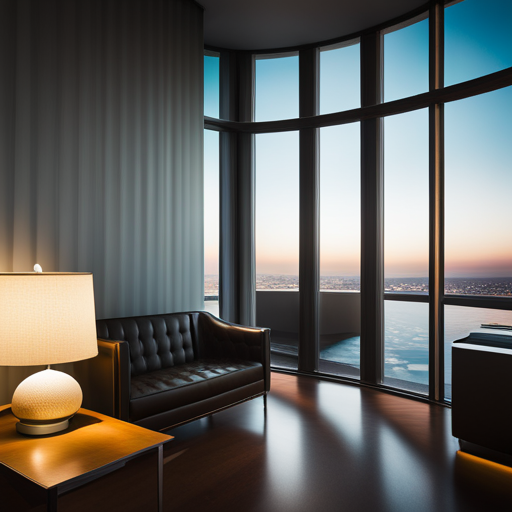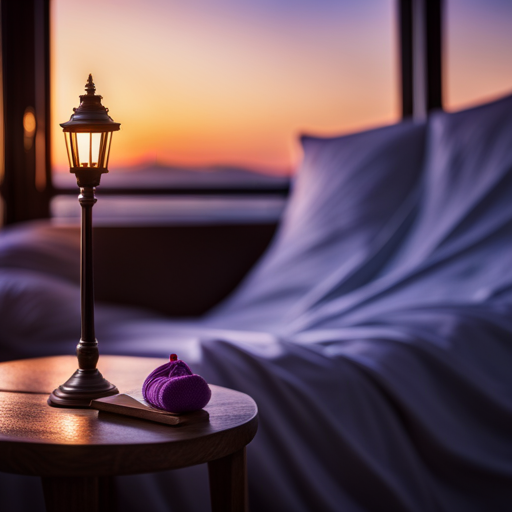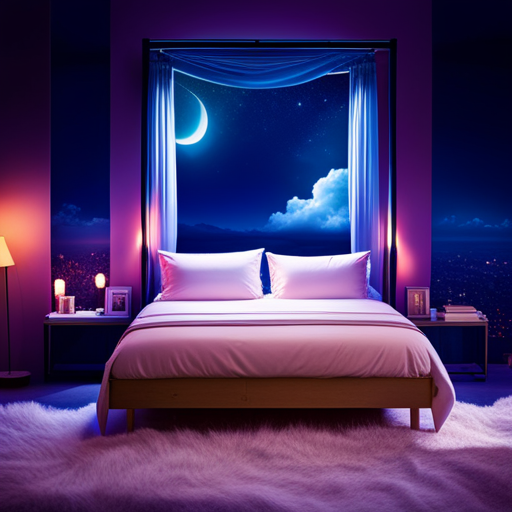Have you ever delved into the intriguing and enchanting realm of hotel dreams? Those moments when you are swept away to a place where reality and fantasy merge, where vivid scenarios play out with vividness and detail. This phenomenon has captured my interest for years, and my research has shown that I am not the only one intrigued by this experience.
Many individuals report experiencing exceptionally vivid dreams when staying at a hotel.
But why does this happen? What is it about the new surroundings of a hotel that can ignite such a heightened dream experience?
In this article, we will explore the fascinating connection between hotels and dreaming. We will delve into the psychological factors that influence dream intensity, the role of sleep environment in dream formation, and the cultural and symbolic influences that shape our hotel dreams.
So, join me as we embark on a journey into the intriguing world of hotel dreams. Together, we will uncover the secrets behind these vivid nocturnal adventures and learn how to enhance our dream recall and analysis. Get ready to be captivated by the mysteries that unfold when we close our eyes in a hotel room.
Key Takeaways
- Staying in a new hotel can result in more vivid and intense dreams.
- Changes in environment can have a significant impact on dream quality.
- Disrupted sleep patterns and exposure to unfamiliar stimuli can contribute to more vivid dreams.
- Dream symbolism in hotel dreams can result in richer and more complex dream content.
The Effect of New Surroundings on Dream Quality
When you stay in a new hotel, the unfamiliar surroundings can really amp up the quality of your dreams. Dream interpretation has long been a fascinating field, and researchers have found that changes in our environment can have a significant impact on our dreams.
One study conducted by Dr. Deirdre Barrett, a dream researcher at Harvard University, found that individuals who slept in unfamiliar settings reported having more vivid and intense dreams compared to when they slept in their own beds. This could be attributed to the brain’s heightened state of alertness in a new environment, as it tries to make sense of the unfamiliar surroundings.
Another factor that may contribute to the enhanced dream quality is the potential sleep disturbances that can occur when staying in a new hotel. The change in bed, pillow, and even the room temperature can disrupt our usual sleep routine, leading to more frequent awakenings throughout the night. These awakenings may increase our dream recall, allowing us to remember the details of our dreams more vividly.
As we delve further into the topic of disruption of routine and dream intensity, we will explore how other factors, such as jet lag and stress, can further enhance the quality of our dreams.
Disruption of Routine and Dream Intensity
Immersed in an unfamiliar environment, your nightly routine undergoes a transformative shift, amplifying the intensity of your nocturnal imaginings. When staying at a hotel, disrupted sleep patterns and exposure to unfamiliar stimuli can contribute to more vivid dreams.
The change in surroundings disrupts our usual sleep routines, causing a shift in our sleep patterns. This disruption can lead to a phenomenon known as the ‘first night effect,’ where the brain remains partially awake to monitor the unfamiliar environment, resulting in fragmented sleep and increased dream intensity.
Additionally, the unfamiliar stimuli present in hotel rooms can also contribute to the intensity of our dreams. The different smells, sounds, and visuals can trigger the brain to create more vivid and detailed dream scenarios. The brain is constantly processing information from our surroundings, and in an unfamiliar environment, it may interpret these stimuli in unique and creative ways, leading to more immersive dream experiences.
As we transition into the subsequent section about increased emotional stimulation and dream vividness, it becomes evident that these factors play a significant role in shaping our dreams. The disruption of routine and exposure to unfamiliar stimuli not only increase the intensity of our dreams but also contribute to heightened emotional stimulation during sleep.
Increased Emotional Stimulation and Dream Vividity
In this emotionally charged state, your dreams become a kaleidoscope of feelings and sensations, painting a vivid tapestry of experiences that transcend the boundaries of reality. The disruption of routine and the new sleep patterns that come with staying at a hotel can lead to increased emotional stimulation during sleep. This emotional stimulation, in turn, can intensify the vividness of your dreams.
When we experience new sleep patterns, such as sleeping in a different bed or environment, our brain may interpret these changes as a signal to pay closer attention to our dreams. This heightened awareness can result in dreams that are more emotionally charged and visually intense.
To illustrate this, imagine a table with two columns and three rows. In the first column, we have the emotions experienced during the dream: joy, fear, and sadness. In the second column, we have the corresponding sensations: laughter, racing heart, and tears streaming down the face. This table represents the heightened emotional stimulation and vividness of dreams that can occur when staying at a hotel.
Understanding these new sleep patterns and the resulting dream interpretation can provide valuable insight into our emotional state and subconscious thoughts. It allows us to explore and understand our innermost feelings in a way that may not be possible during our waking hours.
As we delve further into the role of sleep environment in dream formation, we will explore how the hotel setting influences the content and themes of our dreams.
The Role of Sleep Environment in Dream Formation
The sleep environment at a hotel can dramatically shape the dreamscape, eliciting a profound emotional journey for the slumbering mind. Dream interpretation suggests that the external stimuli present during sleep can influence the content and intensity of our dreams. This notion is supported by research on sleep disorders, which has shown that individuals with certain sleep disorders, such as sleep apnea or restless legs syndrome, often report more vivid and emotionally charged dreams.
One possible explanation for this phenomenon is that the sleep environment in a hotel is different from our familiar sleeping environment at home. The unfamiliar sounds, smells, and sensations can act as triggers for our dreams, leading to more intense and memorable experiences. Additionally, hotels often have different lighting conditions, temperature settings, and bedding materials, all of which can contribute to a different sleep experience. These variations in the sleep environment can stimulate the brain in unique ways, resulting in dreams that are more vivid and emotionally stimulating.
Understanding the role of the sleep environment in dream formation is crucial for both researchers and individuals interested in exploring the depths of their dreams. By recognizing the impact that external factors can have on our dream experiences, we can gain insights into our subconscious minds and potentially uncover hidden emotions or unresolved conflicts.
Transitioning into the next section about psychological factors influencing dream experience, it is important to consider how our personal beliefs and experiences shape the way we perceive and interpret our dreams.
Psychological Factors Influencing Dream Experience
Imagine yourself deep within the recesses of your mind, where your personal beliefs and experiences intertwine to shape the kaleidoscope of emotions and symbolism that dance across your dreamscapes. When it comes to dream formation, there are several psychological factors that can influence the vividness and content of our dreams, especially when staying at a hotel. One such factor is disrupted sleep. Being in an unfamiliar environment can disrupt our sleep patterns, leading to more frequent awakenings throughout the night. These awakenings can result in a phenomenon known as the "dream rebound effect," where our dreams become more intense and vivid as our brain tries to compensate for the disrupted sleep.
Another psychological factor that influences dream experience is dream symbolism. Dreams are often filled with symbols that represent our thoughts, emotions, and experiences. When staying at a hotel, we may encounter new and unfamiliar stimuli, such as different room layouts or decorations. These novel experiences can trigger unique symbols in our dreams, adding to the richness and complexity of our dreamscapes.
To further understand the relationship between staying at a hotel and dream experience, let’s take a look at the following table:
| Psychological Factors | Influence on Dream Experience |
|---|---|
| Disrupted Sleep | More vivid and intense dreams |
| Dream Symbolism | Richer and more complex dream content |
As we delve deeper into the impact of travel stress on dream content, we will explore how the stressors associated with traveling can shape our dreamscape in unexpected ways.
The Impact of Travel Stress on Dream Content
Amidst the chaos of travel stress, our dreams become a turbulent storm, as if the weight of delayed flights and lost luggage are crashing waves against the shores of our subconscious. The impact of travel stress on dream content has been a subject of interest in the field of dream interpretation and sleep disorders.
Studies have shown that when individuals experience high levels of stress during travel, their dreams tend to be more vivid and intense. One possible explanation for this phenomenon is that stress activates the amygdala, a part of the brain responsible for processing emotions. When we’re stressed, the amygdala becomes hyperactive, leading to heightened emotional responses even during sleep. This emotional arousal can manifest in our dreams, resulting in more vivid and emotionally charged dream experiences.
Moreover, travel stress can disrupt our regular sleep patterns, leading to fragmented and restless sleep. This can contribute to the occurrence of sleep disorders such as insomnia, which in turn can affect the content and intensity of our dreams. Sleep deprivation and irregular sleep patterns have been found to increase dream recall and intensity.
As we delve into the cultural and symbolic influences on hotel dreams, we’ll explore how these factors intertwine with the impact of travel stress on our dream experiences.
Cultural and Symbolic Influences on Hotel Dreams
Step into the enchanting world of hotel dreams, where the vibrant tapestry of cultural influences and symbolic imagery creates a captivating and immersive experience for your subconscious mind.
Cultural symbols in dreams play a significant role in shaping our dream content when we stay at hotels. From the moment we step foot into a new hotel, we are bombarded with unfamiliar sights, sounds, and smells, all of which can seep into our dreams and influence their content.
Dream interpretation and hotel stays go hand in hand, as the unique cultural symbols present in hotels can provide valuable insights into our subconscious thoughts and emotions. For example, the presence of exotic flowers in the hotel room may symbolize beauty, growth, and rejuvenation. The intricate patterns on the hotel wallpaper may represent a desire for order and structure in our lives.
In addition to cultural symbols, hotels also introduce us to new experiences and environments, which can further impact our dreams. The hotel lobby bustling with people from different backgrounds can symbolize a desire for social connection and diversity. The luxurious amenities in the hotel room may represent a longing for comfort and indulgence.
As we delve deeper into exploring lucid dreaming and hotel stays, it becomes evident that our dreams are not merely random sequences of events. They are deeply influenced by the cultural and symbolic aspects of our surroundings, offering us a window into our innermost thoughts and desires.
Exploring Lucid Dreaming and Hotel Stays
When we delve into the realm of lucid dreaming during our hotel stays, we uncover a profound connection between our conscious and subconscious minds. Lucid dreaming is a technique that allows individuals to become aware that they’re dreaming while they’re still in the dream state. This awareness enables dreamers to actively participate and manipulate their dreams, leading to a heightened sense of control and self-awareness.
There are various techniques that can be used to induce lucid dreaming, such as reality checks, keeping a dream journal, and practicing meditation before sleep. These techniques can be particularly effective when practiced in a hotel setting, as the unfamiliar environment may trigger increased dream awareness. Additionally, the symbolic nature of dreams can be explored and interpreted in relation to the hotel stay.
For example, the hotel itself may represent a temporary or transitional state in one’s life.
By utilizing lucid dreaming techniques and exploring dream interpretation, we can gain valuable insights into our subconscious thoughts, emotions, and desires. This self-reflection can provide a deeper understanding of ourselves and help us navigate our waking lives with greater clarity and purpose.
As we move into the next section about tips for enhancing dream recall and analysis, it’s important to note that the process of understanding our dreams is an ongoing journey of self-discovery.
Tips for Enhancing Dream Recall and Analysis
As we delve deeper into the world of lucid dreaming and hotel stays, it is important to explore techniques for enhancing dream recall and analysis. One of the most effective ways to do this is through dream journaling. By keeping a record of our dreams, we can gain insight into our subconscious mind and better understand the messages and symbols that arise during sleep.
To help you get started with dream journaling, I have prepared a table below that outlines some key tips for enhancing dream recall and analysis:
| Tip | Description |
|---|---|
| Keep a Journal | Write down your dreams as soon as you wake up, capturing as much detail as possible. |
| Reflect and Analyze | Take time to reflect on your dreams and analyze the symbols, emotions, and themes present. |
| Look for Patterns | Pay attention to recurring elements or themes in your dreams, as they may hold deeper meaning. |
| Seek Expert Insight | Consider consulting with a dream interpretation expert to gain further understanding of your dreams. |
By incorporating these tips into your dream journaling practice, you can unlock the hidden meanings within your dreams and gain a deeper understanding of yourself. This process of introspection and analysis sets the stage for the fascinating connection between hotels and dreaming, which we will explore in the next section.
The Fascinating Connection Between Hotels and Dreaming
Immerse yourself in the captivating realm where your mind wanders and intertwines with the ethereal tapestry of slumber, akin to the enigmatic connection between hotels and the enchanting realm of dreaming.
When staying at a hotel, many people experience vivid dreams unlike any other. This phenomenon has intrigued scientists and dream enthusiasts alike, leading to deeper exploration into the fascinating connection between hotels and dreaming.
Dream interpretation plays a crucial role in understanding the significance of these vivid dreams. The unfamiliar environment of a hotel can trigger unique dream scenarios, often reflecting our subconscious thoughts, emotions, and desires. Analyzing these dreams can provide valuable insights into our inner workings, allowing us to better understand ourselves and our experiences.
Furthermore, the quality of sleep in hotels can also influence dream vividness. Sleep disorders such as insomnia or sleep apnea can impact the depth and duration of our REM sleep, which is when dreams occur. The unfamiliar and sometimes noisy environment of a hotel room may disrupt our sleep, leading to more fragmented dreams that are easier to recall upon waking.
The connection between hotels and dreaming is a captivating subject. By delving into dream interpretation and considering the impact of sleep disorders, we can gain a deeper understanding of the vivid dreams that often occur when staying at a hotel. So, the next time you find yourself in a hotel room, embrace the possibilities of your dreams and let your mind wander through the enchanting realm of slumber.
Frequently Asked Questions
How can I enhance my dream recall and analysis while staying at a hotel?
To enhance my dream recall and analysis while staying at a hotel, I can utilize effective dream journaling techniques. By keeping a journal next to my bed and recording any dreams immediately upon waking, I can improve my ability to remember and process the details of my dreams.
Additionally, incorporating relaxation techniques such as meditation or deep breathing exercises before bed can help create a calm and receptive mental state, enhancing dream recall and analysis.
What are some psychological factors that can influence my dream experience during a hotel stay?
Psychological factors can significantly influence dream experiences during a hotel stay. One crucial factor is dream symbolism, where our subconscious mind uses symbols to represent complex emotions and experiences.
Additionally, the sleep environment plays a role. Factors such as unfamiliar surroundings, noise levels, and comfort can impact the quality of sleep, which in turn affects dream recall and intensity.
Understanding these factors can help enhance dream analysis and provide insights into our subconscious mind.
Are there any cultural or symbolic influences that can affect the content of hotel dreams?
Cultural and symbolic influences can greatly impact the content of dreams experienced during a hotel stay. In fact, a study conducted by researchers at the University of California found that cultural background significantly influenced dream themes and symbols.
For example, individuals from East Asian cultures often reported dreams with more collective and social themes, while individuals from Western cultures had dreams that focused more on individualistic and personal experiences. These findings highlight the importance of cultural and symbolic factors in shaping dream content.
Can travel stress have an impact on the vividness of dreams during a hotel stay?
Travel stress, including factors such as jet lag and unfamiliar surroundings, can indeed impact the vividness of dreams during a hotel stay. Research suggests that disruptions to our normal sleep patterns caused by jet lag can lead to more intense and vivid dreaming.
Additionally, being in an unfamiliar environment can also contribute to the heightened intensity of dreams. These factors combine to create a perfect storm for rich and vivid dream experiences during hotel stays.
Is there a connection between lucid dreaming and hotel stays?
There’s a potential connection between lucid dreaming and hotel stays. Lucid dreaming techniques involve becoming aware that you’re dreaming while in the dream state. This ability may be influenced by the hotel room environment. The unfamiliar surroundings and different sleep patterns that often occur during hotel stays could potentially enhance the likelihood of having a lucid dream. However, further research is needed to fully understand and confirm this connection.
Conclusion
So there you have it, folks, the intriguing connection between hotels and dreaming! Who knew that checking into a hotel could turn your dreams into a Hollywood blockbuster?
It seems that the new surroundings, disrupted routines, and increased emotional stimulation all play a role in making our dreams more vivid and intense. And let’s not forget the psychological and cultural factors that influence our dream experience.
So next time you find yourself staying at a hotel, be prepared for some mind-blowing dream adventures! Sweet dreams, and happy hotel hopping!










